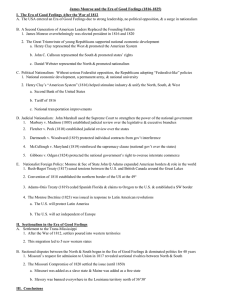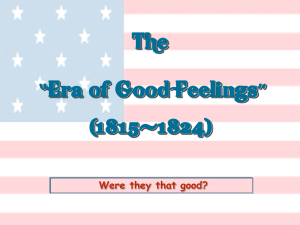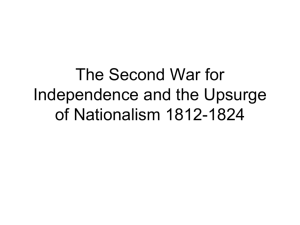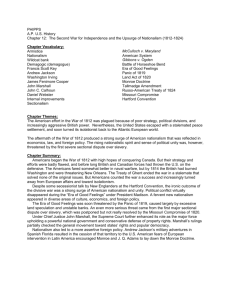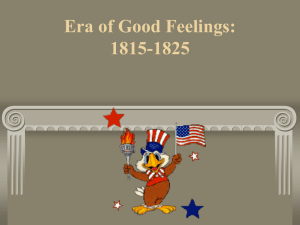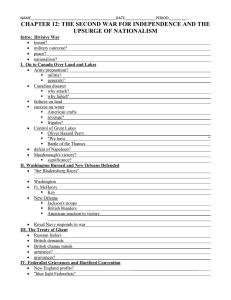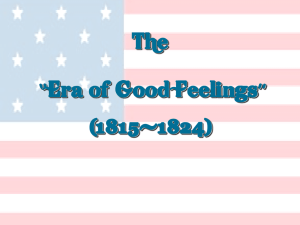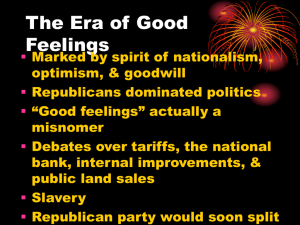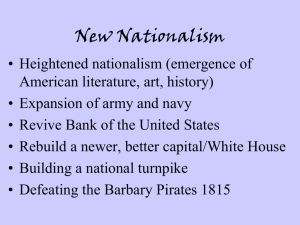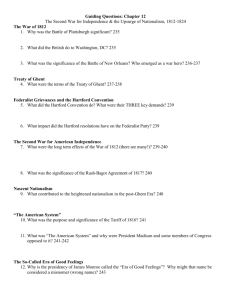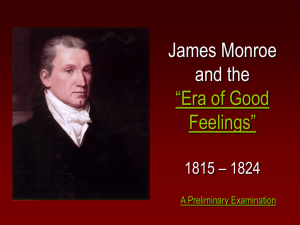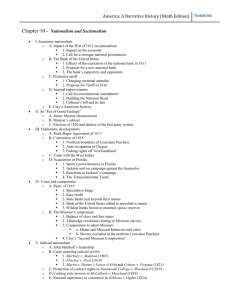4C Era of Good Feelings
advertisement
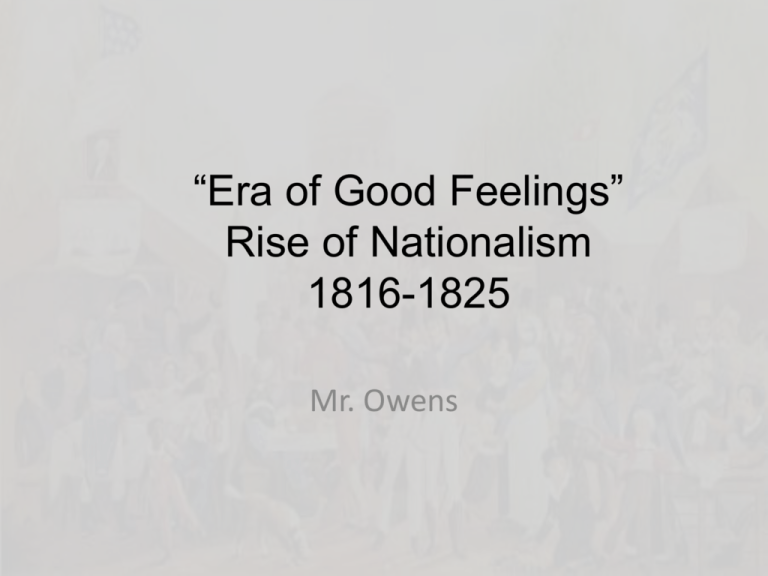
“Era of Good Feelings” Rise of Nationalism 1816-1825 Mr. Owens Essential Questions 1. To what extent did both cultural nationalism and sectionalism emerge during this era? 2. What were examples of a new American national culture that emerged in this era and how was it both influenced by and distinct from Europe? 3. What was the American System? “Era of Good Feelings” • Reflects surge of nationalism, optimism & good will • Election of 1816 James Monroe easily defeats Rufus King – Federalist decry “Virginia Dynasty” • Election of 1820 Monroe runs unopposed (Federalist Party dead) & receives all but 1 electoral vote • Expansion & National Respect & Cultural Pride • How accurate a label? Economic Nationalism • Expansion of national economy • Tariff of 1816: first truly protective tariff to protect from postwar British goods • Henry Clay’s American System: 1. Protective tariffs 2. National Bank – 2nd BUS charter (1816-1836) 3. Internal improvements (roads & canals) • Madison & Monroe viewed federal funding for internal improvements unconstitutional - veto Henry Clay Not So Good Feelings? • Panic of 1819: 2nd BUS tightens credit to control inflation caused by western land speculation, caused bank failures, bankruptcies, unemployment & debtors prison – West hit hardest – anti BUS – 6 Year economic depression • Death of Federalists, Democratic-Republicans began to divide • Many northern Dem-Reps adopted many Federalist views like support for large standing army & National Bank • 1824 Election splinter into factions & run 4 separate regional candidates Marshall Court 18011835 • Rulings consistently favored a strong central government & property rights over state rights • Marbury v. Madison (1803) Judicial Review • Fletcher v. Peck (1810) • Martin v. Hunter’s Lease (1816) • Dartmouth College v. Woodward (1819) • McCulloch v. Maryland (1819) “the power to tax is the power to destroy” – Daniel Webster, BUS is constitutional due to “implied power” from “Necessary & Proper clause” • Cohens v. Virginia (1821) • Gibbons v. Ogden (1821) Chief Justice John Marshall Daniel Webster Go West! Causes & Effects of Western Migration 1. 2. 3. 4. • Taking of American Indian land – victories of Harrison & Jackson, Indians driven from land Economic pressures – unemployment from Embargo & war, new opportunities West, cotton plantations in Alabama, Miss. & Ark. Transportation improvement – roads, canals, steamboats, & eventually railroads Rise of immigration attracted to cheap land near Great Lakes & Ohio & Mississippi River valleys Westerns states limited population, called for: 1. 2. 3. • “Cheap money” easy credit Low prices for land Improved transportation New Conflict: expansion of slavery 1820 Pop density Missouri Crisis & Compromise 1820 • 1791-1792 Vermont & Kentucky entered jointly for free state/slave state balance • Missouri applies as a slave state – opened sectional divide • Tallmadge Amendment: Rep James Tallmadge of NY proposed: no further slaves in Missouri, slaves born in state free at age of 25 – passed House but not Senate – why? • Missouri Compromise: Henry Clay 1. Missouri as a slave state 2. Maine as a free state 3. No slavery north of 36*30’ lat. • “But this momentous question, like a firebell in the night, awakened and filled me with terror. I considered it at once as the knell of the Union.” - Jefferson Foreign Policy • Sec. of State John Quincy Adams • Rush-Bagot Agreement (1817) mutual disarmament of Great Lakes between US & Canada • Treaty of 1818 – US & Britain 1. Shared fishing rights in Newfoundland 2. 10 year joint occupation of Oregon 3. 49th Parallel US-Canada border Florida: • Jackson’s 1st Seminole War (1818) • Monroe sends Jackson to “pacify” Seminoles, did he exceed his orders? • “Eye for an eye, tooth for a tooth, scalp for a scalp” - Jackson • Arbuthnot & Armbrister Incident – war? • Adams-Onis Treaty (Florida Purchase Treaty of 1819) Spain gave US Florida & Oregon claims in exchange for Texas The Monroe Doctrine, 1823 Inserted in annual message to Congress Referred to as America’s Self-Defense Doctrine. Reflected rising nationalism of the era. 1. What foreign policy principles are established? 2. What warning is given to the European countries? Monroe Doctrine 3. What would the US do if the warning was not headed?
